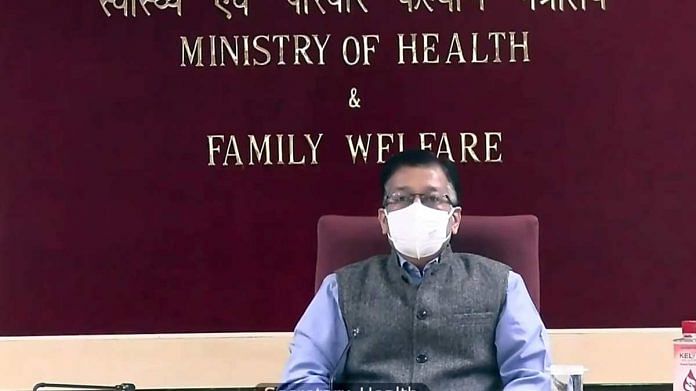New Delhi: A day after it announced a mission for speedy approval to a Covid-19 vaccine, the central government Tuesday clarified it is not looking at vaccinating all citizens, but rather at achieving a “critical mass” that would ensure that the chain of transmission of the SARS-CoV-2 virus is broken.
It also clarified that in case of both the adverse events — during the phase 1 trial of Covaxin (developed by Bharat Biotech) and phase 2 trial of Covisheld (manufactured by Serum Institute of India) — all checks and balances were applied before allowing the trials to continue.
“The government never spoke about vaccinating the entire country. It is very important to get the factual information on these things,” Health Secretary Rajesh Bhushan said, while replying to a question on whether the Covid vaccine will be available free of cost.
Secretary, Health Research, and ICMR chief Dr Balram Bhargava clarified: “We may or may not need to vaccinate all. If we can reach a critical mass before doing so, then it is not required. That is why measures like masks etc. will need to continue.”
A critical mass refers to a point when there are enough people in the population, who have received the vaccine for the chain of transmission to be broken. This is called herd immunity.
The government has already announced that as and when a vaccine becomes available, the priority groups are going to be doctors, healthcare workers, elderly and people with comorbidities.
No decision has yet been taken on whether the vaccine will be given to people who have already recovered from the disease, Bhushan said. The matter is being debated by the National Expert Group of Vaccine Administration for Covid, of which Bhushan is a co-chair.
Dr Bhargava said there are two issues to this — one is the possibility of adverse events because of prior immunity and the second is whether it is possible to avoid giving the vaccine to recovered patients (as they are already immune). He added there is enough data currently, which said that the former does not happen.
Also read: 8 Covid vaccines that look most likely to lead us out of pandemic — and where they stand
‘All due processes applied’
Asked about the lack of transparency on the vaccine adverse events that were reported in the ongoing Covid vaccine trials, Bhushan said: “The fact is that the adverse events referred to happened in August (for Bharat Biotech) and October (for Serum Institute/AstraZeneca).”
“All the (vaccine trial regulatory) processes were complied with and causality assessment findings did not reveal anything that would necessitate the stoppage of these trials,” Bhushan said.
He laid down the tiered mechanism for regulation, starting with the signing of the informed consent form by the subject, the principal investigator’s report for the Drug Controller General of India on the adverse event, examination by the Institutional Ethics Committee and the Data Safety Monitoring Board, all of which are “independent of the government and the manufacturers of the vaccine”.
He said both the companies had been allowed to go ahead after all scrutiny had been completed.
A vaccine volunteer had last month sent a legal notice to Serum Institute, alleging he had serious side-effects because of the Covishield vaccine. Serum, in turn, filed a Rs 100-crore retaliatory lawsuit against the volunteer, inviting criticism for allegedly resorting to strong-arm tactics.
Serum Tuesday issued a statement saying: “The Covishield vaccine is safe and immunogenic. The incident with the Chennai volunteer, though highly unfortunate, was in no way induced by the vaccine, and Serum Institute of India is sympathetic with the volunteer’s medical condition.”
“However, we would like to clarify that all the requisite regulatory and ethical processes and guidelines were followed diligently and strictly … It is only after we cleared all the required processes that we continued with the trials,” the statement added.
Ministry working on vaccine roll out guidelines
The health ministry has started work on putting together a set of guidelines for states on the do’s and don’ts of vaccine administration and how to achieve systemic preparedness.
In light of the recurring issue of vaccine hesitancy, Bhushan said the guidelines will also include a chapter on how to counter vaccine misinformation.
The matter had also come up for discussion when Prime Minister Narendra Modi had a meeting with chief ministers of all states last week to discuss the Covid vaccine rollout.
Also read: Why fewer people are awaiting a Covid-19 vaccine now compared to 3 months ago




In UK the adverse event caused the trials to be suspended for a brief while. There seems to be no pause for reflection from our govt authorities.
Will the Health ministry, ICMR, DCGI etc and all the top officials in these entities please take the vaccine doses first before recommending it to the public.
A fudge. Most unfortunate.
Note he has not replied to whether the vaccine will be free or not.